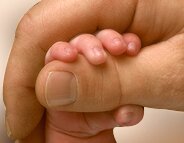| |
For Women
Maternal age is probably the most significant factor related to a woman's ability to conceive. While many women today are waiting to try and become pregnant, the ovary's ability to produce normal, healthy eggs, declines with age, increasing the risk of chromosomal abnormalities and unsuccessful implantation.
The likelihood for successful pregnancy begins to decrease in the early 30s. While this decline is initially quite minimal, as years pass, the rate of decline in fertility increases and begins to rapidly accelerate around 37-38 with an acute fall beyond 42 years of age. Because of the importance of maternal age, many physicians recommend that women over 35 should pursue a fertility evaluation after attempting for six months. Couples under age 35 should consider evaluation if conception does not occur after a year of attempts. (A woman using donor insemination should ask her physician about an infertility evaluation after six months.)
Other factors, such as endometriosis or uterine fibroids can also play a role in infertility, though many women with these conditions conceive healthy children without trouble.
For Men
Over the last several decades, concern has risen about the impact of industrialization on reproductive health. This concern stems largely from reports that show that semen quality of men in Europe and the US has decreased over the latter half of the twentieth century. Some environmental factors may be implicated in this semen quality decline and that may affect reproductive health in general.
Exposure to environmental agents is thought to have a toxic effect on sperm quality, but the evidence behind most of these scientific claims is rather weak. This is because it is hard to actually demonstrate the cause-effect relationship of toxins to sperm quality. Human toxin studies are generally not well-controlled because of many variables that influence the findings. Most of the information we have is derived from animal studies and may not necessarily reflect a true effect that exists in the human condition.
The environmental toxins that are most often cited as potential contributors to infertility can be organized into physical, chemical, occupational, and lifestyle factors. Hyperthermia (increased temperature), radiation, and electromagnetic fields, for example, are several physical factors that have been linked to infertility in men. Cigarette smoking, excessive alcohol consumption, marijuana and cocaine use, and caffeine intake may contribute to chemical causes of infertility. Occupational hazards such as some pesticides, industrial toxins like dioxin and PCBs, and exposure to heavy metals may also be linked to infertility. Finally, stress, nutrition, and other lifestyle factors can also play a role.
Unfortunately, it is difficult to make recommendations on how to prevent exposure to many of these toxins because their sources are common, the exposure levels unclear, and the populations at risk difficult to define. One very reassuring thing to know is that, recently, the government has taken a keen interest in developing ways to precisely define these variables and therefore get a feel for the magnitude of the problem.
Your overall health is a reflection of your reproductive health. Give yourself a long and healthy life. Consider the following tips to stay healthy.
- Maintain a normal body weight. Weighing too much OR too little can not only put your health at risk, but can also diminish your fertility.
- Exercise to maintain fitness, adding weight training as you age (especially over 40) to increase muscle mass and maintain a healthy body. But be careful not to over-exercise and strain your body (e.g., consistently running more than 6-10 miles/day).
- Don't smoke. Smoking lowers your chances for pregnancy, increases the risk of miscarriage, and smokers tend to go through menopause 2 years earlier than non-smokers.
- Never have unprotected sex. The sexually transmitted disease that you acquire today can affect your fertility tomorrow.
- When you're ready to have children, don't delay. Age of female partner is the number one determinant of successful fertility treatment for all couples. Duration of infertility is the second most important factor. Once you're actively trying to conceive, don't delay evaluation, especially if you're over 35. If your cycles are regular, seek help after 12 months, or after 6 months if you're over 35. If your cycles are not regular, seek help immediately. Once you've started treatment, expect the evaluation to be completed in no more than 2 months and treatment cycles to range from 3-6 months before progressing to the next step.
- Stay informed. Be the captain of your ship and always understand what is asked of you by your physician. Ask questions.understand the process.become actively involved in your health.
The best approach to staying fertile in today's busy world is to take care of yourself: eat well, sleep well, reduce your stress, and take all things in moderation. Consider your body a temple and take care of it as a good healthy body is a good reproductive body.
|
|



